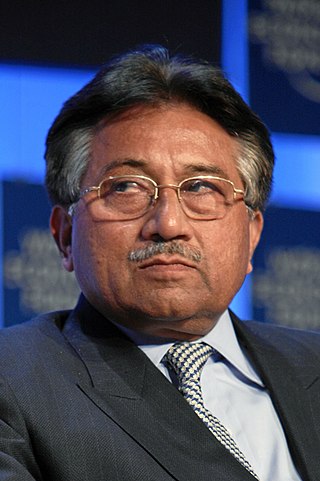
Pervez Musharraf was a Pakistani military officer and politician who served as the tenth president of Pakistan from 2001 to 2008.
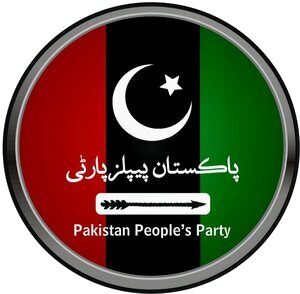
The Pakistan People's Party is a centre-left political party in Pakistan, currently being the largest in the Senate and second-largest party in the National Assembly. The party was founded in 1967 in Lahore, when a number of prominent left-wing politicians in the country joined hands against the rule of Ayub Khan, under the leadership of Zulfikar Ali Bhutto. It is affiliated with the Socialist International. The PPP's platform was formerly socialist, and its stated priorities continue to include transforming Pakistan into a social-democratic state, promoting egalitarian values, establishing social justice, and maintaining a strong military. It, alongside the Pakistan Muslim League-Nawaz and the Pakistan Tehreek-e-Insaf, is one of the three largest political parties of Pakistan.

The Pakistan Muslim League (N) abbreviated as PML (N), (Urdu: پاکستان مسلم لیگ (ن)) is a centre-right, conservative liberal political party in Pakistan. It is currently the third-largest party in the Senate and the largest in the National Assembly. The party was founded in 1993, when a number of prominent conservative politicians in the country joined hands after the dissolution of Islamic Democratic Alliance, under the leadership of former Prime Minister Nawaz Sharif. The party's platform is generally conservative, which involves supporting free markets, deregulation, lower taxes and private ownership. Although the party historically supported social conservatism, in recent years, the party's political ideology and platform has become more liberal on social and cultural issues; however, members have been accused of using Islamist populist rhetoric. Alongside the Pakistan Tehreek-e-Insaf (PTI) and Pakistan People's Party (PPP), it is one of the three major political parties of the country.

The Pakistan Muslim League Urdu: پاکستان مسلم لیگ (ق); Pākistān Muslim Līg (Qāf), Acronyms: PML(Q), PML-Q, PMLQ, "Q League" is a political party in Pakistan. As of the 2024 parliamentary election, it has a representation of five seats. It previously served as an ally of former prime minister Raja Pervez Ashraf's government, and led a joint election campaign in 2013 alongside Pakistan Peoples Party (PPP) in Punjab and Balochistan provinces against its rival Pakistan Muslim League (N), a fiscally conservative and centre-right force.

The president of Pakistan is the head of state of the Islamic Republic of Pakistan. The president is the nominal head of the executive and the supreme commander of the Pakistan Armed Forces. The presidency is a ceremonial position in Pakistan. The president is bound to act on advice of the prime minister and cabinet. Asif Ali Zardari is the current president since 10 March 2024.

Since its establishment in 1947, Pakistan has had a non-symmetric federal government and is a federal parliamentary democratic republic. At the national level, the people of Pakistan elect a bicameral legislature, the Parliament of Pakistan. The parliament consists of a lower house called the National Assembly, which is elected directly via first-past-the-post voting, and an upper house called the Senate, whose members are chosen by elected provincial legislators. The head of government, the Prime Minister, is elected by the majority members of the National Assembly and the head of state, the President, is elected by the Electoral College, which consists of both houses of Parliament together with the four provincial assemblies. In addition to the national parliament and the provincial assemblies, Pakistan also has more than five thousand elected local governments.
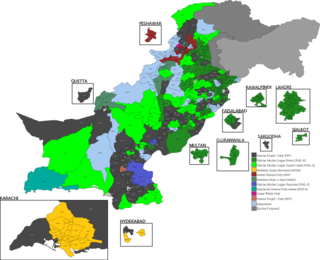
General elections were held in Pakistan on 18 February 2008 to elect members of the 13th National Assembly and the four Provincial Assemblies.

Mahmud Khan Achakzai is a Pakistani Pashtun regionalist politician who is the Chairman of Pashtunkhwa Milli Awami Party. Achakzai completed his Engineering degree from the Peshawar University of Engineering and Technology. In 7th National Congress of Pashtunkhwa Milli Awami Party on 19, 20 December 2022 Mahmood khan Achakzai re elected as the Chairman Of PkMAP. He is serving as member of National Assembly of Pakistan since 29 February 2024.
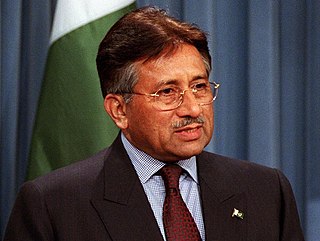
An indirect presidential election was held in Pakistan on 6 October 2007. This was before dissolution of parliament for the following general election to be held in 2008. The Pakistani legislature elected incumbent Pervez Musharraf by an overwhelming majority. The near-unanimous nature of Musharraf's victory was made possible by the absence of two key political opposition leaders, Nawaz Sharif and Benazir Bhutto. Nawaz Sharif had attempted to return to Pakistan before the election but was deported back into exile by the ruling government because of a gross violation of the agreement he had signed with the current regime to stay out of Pakistan and its politics for a period of ten years. Benazir Bhutto had also announced her intention to return to Pakistan for the elections but ultimately decided not to do so. It was widely assumed that her decision was the result of an arrangement she made with Musharraf.
The Karsaz bombing attack occurred on 18 October 2007 in Karachi, Pakistan; it was an attack on a motorcade carrying former Prime Minister Benazir Bhutto. The bombing occurred two months before she was assassinated.
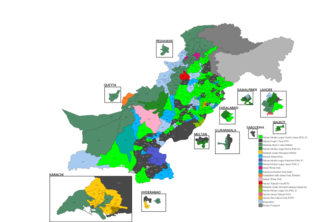
General elections were held in Pakistan on 10 October 2002 to elect the 12th National Assembly and four Provincial Assemblies. The elections were held under the military government of Pervez Musharraf. The two mainstream parties, Pakistan Peoples Party (PPP) and Pakistan Muslim League (N) (PML-N) had several restrictions imposed on them and their leaders Benazir Bhutto and Nawaz Sharif were in exile. In order to address the restrictions, PPP created the Pakistan Peoples Party Parliamentarians (PPPP) under the leadership of Ameen Faheem, to contest the elections on its behalf. The PML-N meanwhile, suffering from the party's division into two factions: one that remained loyal to Sharif and were contesting the elections under the leadership of Javed Hashmi, and the other which had broken away to form the pro-Musharraf Pakistan Muslim League (Q) (PML-Q) under the leadership of Mian Muhammad Azhar. The emergence of the PML-Q marked the beginning of multi-party politics in the country, bringing an end to the decade-long two-party system between the PPP and PML-N.
Events from the year 2007 in Pakistan.
Events from the year 2008 in Pakistan.

Mian Raza Rabbani is a Pakistani politician and lawyer who served as the 7th Chairman of the Senate of Pakistan from March 2015 to March 2018. He has been affiliated with the Pakistan Peoples Party since 1968.
The effort to impeach Pervez Musharraf was an August 2008 attempt by opposition parties comprising the Pakistan Peoples Party (PPP), Pakistan Muslim League (N) (PML-N), Awami National Party (ANP), and Jamiat Ulema-e-Islam to force Pakistan's President Pervez Musharraf out of office. On August 18, Musharraf announced his resignation.

An indirect presidential election was held on 6 September 2008 in Pakistan. The Electoral College of Pakistan – a joint sitting of the Senate, National Assembly and Provincial Assemblies – elected a new president after the resignation of President Pervez Musharraf. As required by the constitution, Muhammad Mian Soomro automatically became acting president on 18 August 2008, upon the resignation of Musharraf. The constitution required that a new president be elected by Parliament within 30 days; Soomro was considered loyal to Musharraf, and it was considered certain that he would be replaced in that election.

The Lawyers' Movement, also known as the Movement for the Restoration of Judiciary or the Black Coat Protests, was the popular mass protest movement initiated by the lawyers of Pakistan in response to the former president and army chief Pervez Musharraf's actions of 9 March 2007 when he unconstitutionally suspended Iftikhar Muhammad Chaudhry as the chief justice of Pakistan's Supreme Court. Following the suspension of the chief justice, the Supreme Court Bar Association (SCBA) declared the judge's removal as an "assault on the independence of judiciary" and was backed by several political parties.
The influences of socialism and socialist movements in Pakistan have taken many different forms as a counterpart to political conservatism, from the groups like The Struggle, Lal Salam which is the Pakistani section of the International Marxist Tendency, to the Stalinist group like Communist Party through to the reformist electoral project enshrined in the birth of the Pakistan People's Party (PPP).

Presidential elections were held on 30 July 2013 in Pakistan to elect the 12th President of Pakistan. Incumbent President Asif Ali Zardari’s term was scheduled to expire on 8 September 2013; and as such, Article 41 of the Constitution of Pakistan required the elections to be held no later than 8 August 2013. The Electoral College of Pakistan – a joint sitting of the Senate, National Assembly and Provincial Assemblies – were tasked with electing a new president to succeed President Zardari, who declined to seek a second term in office. After the Pakistan Peoples Party and its allies boycotted the presidential election, the two candidates were Mamnoon Hussain backed by the Pakistan Muslim League (N), and Wajihuddin Ahmed backed by Pakistan Tehreek-e-Insaf. Agra-born Hussain was elected president by a majority securing 432 votes. The elections were the first time in Pakistani history where a civilian president was elected while an incumbent civilian President was still in office, completing a historic and democratic transition of power that began with the 2013 General Elections.
Aasia Ishaque, is a politician and businesswomen, who is currently serving as a member of the National Assembly of Pakistan since February 2024. She was a senior, active and a vocal leader of Pak Sarzameen Party (PSP). Previously, she served as Secretary Information in All Pakistan Muslim League presided by Pervez Musharraf till 2014 and held the position of Central Secretary of Information in (APML).
















